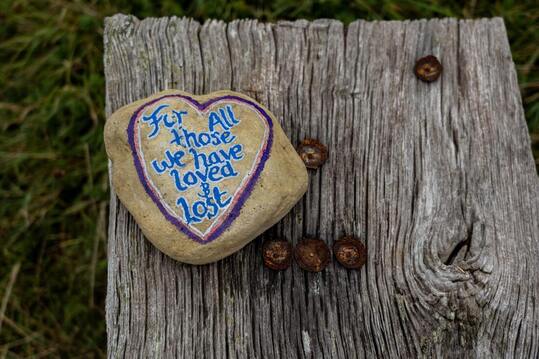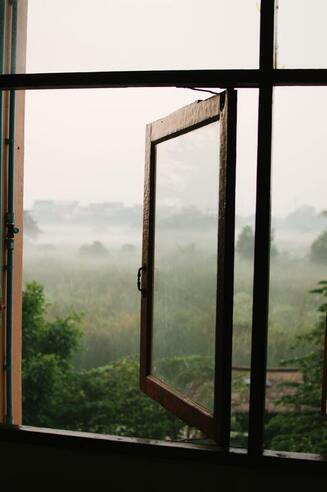|
Today, I find myself wondering about grief. Why is it so different for each of us? Do we ever really “get over” a major loss? Is it possible to follow someone else’s roadmap through the stages of grief? “Stages” sounds pretty linear and my grief is not linear. (Yes, I see the irony since I am a Type A Virgo who can’t make a bag lunch without a to-do list.) I would love grief to be linear. I would have my list completed in record time, boxes neatly checked, hair combed, ready to resume life. But it isn’t like that at all. Grief can blind side you anytime, anywhere. My dad died when I was 14. That’s 42 years ago. If you had asked me two weeks ago if I still grieved for my dad, I would have told you no. Without hesitation. I would have said my memories of him now are pleasant little surprises. Unexpected gifts. So, imagine my surprise when I had a minor meltdown last week after looking at a book about my dad. My sister compiled pictures from my dad’s photo album of his childhood, his emigration from Germany, and his early years in Canada. She also included some text that Dad had been dictating to Mom in the final months of his life. Actually, I didn’t cry when I read the book. I felt strange right after I read it – as though I was watching myself warily from the corner of the room. I put the book down and walked around it like it was booby-trapped. I felt raw and I remember wondering how long it would be before I would feel ready to look at it again. That evening, we watched a musical on television. A filming of the Broadway play, Come From Away. (You have GOT to see it!) Anyhow, there was a poignant moment in the show and I teared up. But the tears didn’t dry up. I actually started to cry a little, then more, then I had to ask my partner to pause the show because I “needed a break” and I started to sob. The last time I cried that hard was about 17 years ago – also about my dad. After my cry, we finished the show (Did I mention you must see it?) and then I tried to process what had happened. This wasn’t the first time that I’d seen new-to-me pictures of my dad. It wasn’t the pictures – it was his words. Hearing his “voice”. And the awareness of his potential, his enthusiasm, his resilience, all those dreams . . . and knowing it was all cut short at 43. When my sister and I talked about it today, she shared that she recently took a course about helping grieving children. Young children will grieve significant losses over and over as they grow up. They will feel their grief anew – and differently – as they move into each new developmental stage. That made me realize that I no longer grieve my loss when I think about my dad, I grieve his loss. I grieve that he never met the adult me, or any of his grandchildren, or great grandchildren. I grieve that he never got the farm he always dreamed of. I grieve all the things he never got to do. And in the next moment, after that deep sadness, I become aware that I have met his grandchildren. And his great grandchildren. I don’t have a farm, but I am living my perfect life. It made me so profoundly grateful to be alive and to have all that I have – love, health, home. By our fifties, most of us have experienced some significant loss. My most significant loss was early, and largely ungrieved at the time (but that’s a story for another day.) When I was crying last week, I felt like I was my 14-year-old self. It has taken many years to do the work of grieving; to feel that I am “over” that loss. And then, an unexpected trigger brings it all back. But that’s okay. I welcome the opportunity to purge my heart of whatever tears have been accumulating for my dad – and all my other losses. And then I opt to share my grief with you. That is to illustrate a point: I believe when we share our stories with others, healing takes place. I believe listening to each other’s stories of grief and loss is a sacred responsibility in our friendships. I like to imagine a world where we are more comfortable with grief. A world in which someone could just say, I’m grieving, as they stood in the middle of the sidewalk crying, and a stranger passing by would nod their understanding, stand silently with them while they cried, then go on their way. Grief is as individual as DNA. What works for me might be useless for you. But I have always found it helpful to hear how others understand and process their grief. Years ago, in a novel, I read a short paragraph about grief which, for me, was the perfect analogy. “Grief is a most peculiar thing; we're so helpless in the face of it. It's like a window that will simply open of its own accord. The room grows cold, and we can do nothing but shiver. But it opens a little less each time, and a little less; and one day we wonder what has become of it.” Arthur Golden, Memoirs of a Geisha My grief window has opened, but only a tiny bit, and I trust the window will close soon enough. If you are being visited by grief today, may your memories be the blanket that protects you from the chill until the window closes again. Image by Hannah Tims on Unsplash
2 Comments
|
Check out Monica's
former blog. Archives
February 2024
|

